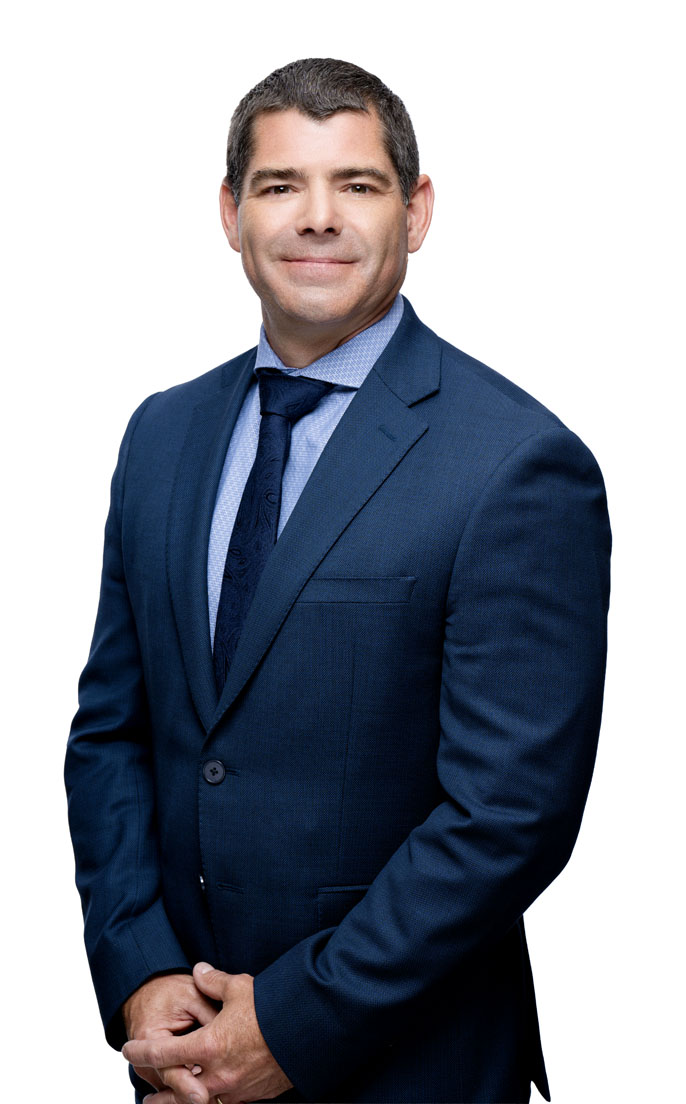Successful leadership is a lifelong process of growth and development. No two leadership paths look the same, and whether setting long-term goals or taking short-term steps to get there, different paths can be taken as we learn and adapt to the countless decisions made along the way. Each journey is unique as we explore different interests, gain new experiences, adapt to changing demands, and mature as leaders. But the strength and courage that come with the willingness to pursue our own path are what sets a leader apart.
Dan Petrousek, senior vice president of loss prevention at Ulta Beauty, is a leader who has experienced this firsthand. While he began his career in LP, he stepped outside his early experiences and spent nearly a decade in human resources, where he crafted a people-first approach to leadership, gained a deeper understanding of enterprise strategy, and refined his ability to align cross-functional teams. He then rejoined the LP team in January 2024, bringing a new and energized perspective to the program.
LP Magazine recently sat down with Petrousek to discuss his unique career journey, how his multi-disciplinary experience has helped elevate Ulta Beauty’s LP program, and the strategic, people-focused formula behind the team’s success.
LPM: Your career path has included several roles outside of LP. What led to those decisions, and how do you feel they have helped shape your professional development and leadership approach?
Dan Petrousek: When I joined Ulta Beauty almost twenty-three years ago, I was an LP professional who only had aspirations to continue along that path. I didn’t necessarily see myself doing anything different. But once I found myself at Ulta Beauty and began to understand the organization and the tremendous amount of growth potential ahead of us, it really inspired me in terms of my ability to grow and contribute. Looking at all the different partners and teams I interacted with, it really piqued my interest as I explored my own career trajectory. I thought about how I had been challenged throughout my career to step outside my comfort zone and take advantage of opportunities as they presented themselves. A role opened on the human resources team, and I saw it as a great opportunity to put myself out there and try something new. So, I expressed my interest in joining that team and was given the opportunity.
My time in HR fundamentally shaped how I lead. Stepping into roles focused on talent, associate relations, and organizational development gave me a people-first lens that I carry with me today. It helped me understand and appreciate the value of aligning people around a vision, not just solving problems in a silo. I learned the importance of influence, of building authentic relationships, and leading through both empathy and enterprise perspective. That background gave me the foundation I needed to contribute more broadly to the organization and add value at a higher level.
LPM: How do you feel this perspective influences your role when leading the LP team?
Petrousek: Leadership is influence. In my role, I must be able to influence not only across our LP function, but also across the different functions we engage with. I’ve learned that influence comes from credibility, collaboration, and transparency. I’m constantly sharing the “why” behind what we do with my team, so they can see how their work ladders up to the broader business. Strategy matters, but strategy without buy-in is just words. Our job as leaders is to make that strategy relevant and actionable for every level of the team.
Empowering people is at the heart of that. I talk to my team often about the importance of advocacy. You earn your advocates, and that happens through your work and having clarity around where you want to grow. Everyone owns their path, but it’s our job as leaders to create an environment where people feel seen, heard, and supported on their path.

LPM: How do you feel this influences your role when partnering with the store teams and others throughout the organization?
Petrousek: Relationships are core to the success of our business. Our strong company culture is predicated on genuine, authentic relationships, putting our guests and associates at the center. As LP leaders, we can’t drive an agenda that’s disconnected from the business. We have to understand the priorities of our business partners so that we can align the priorities of the LP function and work together to accomplish the organization’s goals.
When you have strong relationships in place, alignment happens naturally. You move faster, stay more focused, and deliver better results. But the only way to be effective partners is to understand the business. The successful LP professional is keenly aware of the priorities and the business drivers that keep us moving forward. Our professionals need to have a well-rounded business acumen to best drive shrink reduction and profit enhancement. That’s how we’ve built the credibility of our LP function—we’re business partners first, and that’s a message I carry through every interaction.
LPM: How important is humility in a leader? Why do you feel it is such an important trait in leadership?
Petrousek: Regardless of the role or the level where you’re serving, you’re always growing and learning. And because of that, there are always going to be moments when you make mistakes or missteps. I think it’s important for teams to see that. And when they do, it’s important to own those mistakes and use them as teachable moments. Our mistakes don’t define us—they help mold who we become as leaders. That’s what opens the door for authentic feedback and real-time coaching.
There’s a saying that resonates with me and has helped shape my perspective around communication: “Behave as if the person you’re listening to knows something you don’t.” I encourage everyone to try it—it’s a great exercise in vulnerability and true self-reflection. Operating in that mindset requires you to put yourself outside of what you know and absorb knowledge from others. In my eyes, this is critical for good decision-making as a leader.
LPM: Let’s talk about strategy. In LP, we’re asked to educate the stores on the need to promote sales, protect assets, enhance profitability, and keep people safe. What do you feel are some of the keys to finding the right formula to accomplish all those goals?
Petrousek: Our number one priority is always associate safety. That’s why we built our Enterprise Protection & Intelligence Center (EPICenter), a 24/7 resource for any associate across our 1,450-plus stores and seven distribution centers to get immediate, live support whenever it’s needed. It’s associate-centric by design.
On the profit protection side, we frame our approach through the lens of top line and bottom line. If we enable our stores to run tight operations and deliver great guest experiences, shrink improvement follows. We emphasize simplicity: execute the fundamentals well, and then go deeper where needed to address stores with higher shrink trends. We’ve revised our approach to high-shrink stores this year with focused data, clear action plans, and strong accountability, and we’re seeing great results.
LPM: Organized retail crime is recognized as a major concern across retail. What do you feel is the most effective way to equip the store teams to manage ORC?
Petrousek: First, it’s important to educate the business on what ORC is. We know organized retail crime is more than shoplifting—you can almost take “retail” out of it and just call it organized crime. It involves coordinated, large-scale criminal operations in which sophisticated networks target retailers, resell stolen merchandise, and often fund broader illicit activity. We want our store teams to understand that, so they know how important it is to not intervene and focus on observing and reporting. Our stores know the protocol, they report quickly, and we take it from there.
We’ve invested in a dedicated ORC team whose focus is to investigate and take down organized criminal operations. That helps with role clarity and allows our field LP teams to focus on prevention, education, and day-to-day business support. We make sure to close the loop on ORC cases that are resolved, so our store teams know the important role they play in tackling this issue.
LPM: With all the attention that’s been placed on ORC, what’s the most effective way to keep our LP teams focused on total retail loss and all the different factors mitigating profitability across the organization?
Petrousek: We need to stay disciplined and not get distracted. More importantly, I think our objective should be more about putting the entire process into perspective. When you think about the core disciplines of an LP practitioner, the primary responsibility is to teach, train, and build business acumen while focusing on the internal, external, and operational pieces. It’s incumbent on the LP leadership team to keep our teams focused on these core competencies and not get distracted.
LPM: Given the expanding scope of the business and your role as a leader, what do you feel is the key to finding the bandwidth to balance all the different hats you’re asked to wear?
Petrousek: You’re only as effective as the team that surrounds you. To operate at the level that the organization needs you to perform, you need to build strong teams. You need a team capable of keeping the program operating smoothly. Your teams need to understand the strategy and the mission that is our shared responsibility to uphold, while giving them the autonomy to execute within those functions. As a team, we stay connected and check in often. We stay aligned so that we can stay out of each other’s way.
I’m fortunate to have what I believe is the best leadership team I’ve had in my twenty-plus years here. I have tremendous confidence in their ability to execute our strategy and innovate along the way. When you have high-performing teams around you, it allows you to operate at the level the organization needs.
LPM: As the leader at the top of the pyramid, how do you balance the need to allow your team to learn and grow on their own, with the responsibility to step in and lead the way when you feel it’s necessary?
Petrousek: Teams need to feel empowered and confident in their ability to make decisions. That’s what fuels innovation and engagement. That’s why we specifically established “People Empowerment” and “Partnership Engagement” as foundational to our strategic framework. Regardless of the role, everyone on the LP team is connected to the framework and the priorities of the LP function and the organization. It’s important to create a vision for the team that aligns with the greater mission and culture of the organization, so everyone is working toward the same goals.
For me, satisfaction is about building talent, evolving the function, and fueling our organization with strong, talented people. And I always encourage my team to stretch—take on new roles, diversify their skills, and explore other parts of the business when given the opportunity. Great talent builds a great foundation, but stretching our perspective and experiences can open minds and open doors. It adds value to the program and makes us better at what we do.
LPM: Any closing thoughts as you reflect on your own journey?
Petrousek: You’re only as good as the people around you, whether professionally or personally. If one part of your life is out of alignment, it impacts everything, and you won’t show up as the best version of yourself. As we pursue our professional goals, it’s equally important that we set our sights on our personal life goals and strike the right balance between both in pursuit of what matters most.


